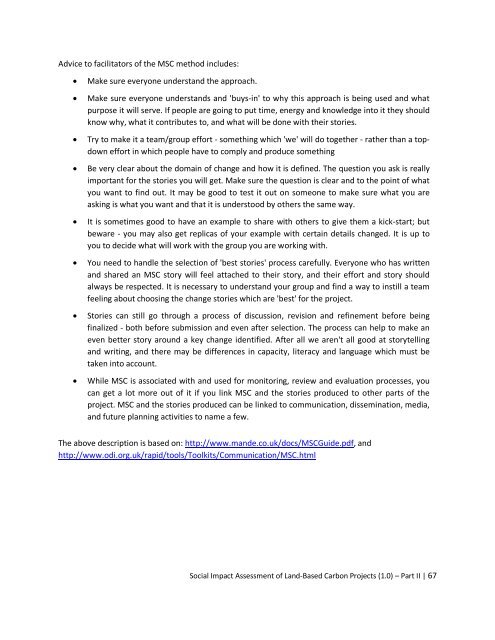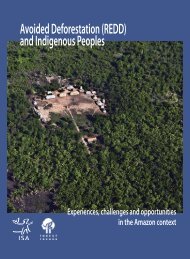manual for social impact assessment of land-based ... - Forest Trends
manual for social impact assessment of land-based ... - Forest Trends
manual for social impact assessment of land-based ... - Forest Trends
Create successful ePaper yourself
Turn your PDF publications into a flip-book with our unique Google optimized e-Paper software.
Advice to facilitators <strong>of</strong> the MSC method includes:<br />
• Make sure everyone understand the approach.<br />
• Make sure everyone understands and 'buys-in' to why this approach is being used and what<br />
purpose it will serve. If people are going to put time, energy and knowledge into it they should<br />
know why, what it contributes to, and what will be done with their stories.<br />
• Try to make it a team/group ef<strong>for</strong>t - something which 'we' will do together - rather than a topdown<br />
ef<strong>for</strong>t in which people have to comply and produce something<br />
• Be very clear about the domain <strong>of</strong> change and how it is defined. The question you ask is really<br />
important <strong>for</strong> the stories you will get. Make sure the question is clear and to the point <strong>of</strong> what<br />
you want to find out. It may be good to test it out on someone to make sure what you are<br />
asking is what you want and that it is understood by others the same way.<br />
• It is sometimes good to have an example to share with others to give them a kick-start; but<br />
beware - you may also get replicas <strong>of</strong> your example with certain details changed. It is up to<br />
you to decide what will work with the group you are working with.<br />
• You need to handle the selection <strong>of</strong> 'best stories' process carefully. Everyone who has written<br />
and shared an MSC story will feel attached to their story, and their ef<strong>for</strong>t and story should<br />
always be respected. It is necessary to understand your group and find a way to instill a team<br />
feeling about choosing the change stories which are 'best' <strong>for</strong> the project.<br />
• Stories can still go through a process <strong>of</strong> discussion, revision and refinement be<strong>for</strong>e being<br />
finalized - both be<strong>for</strong>e submission and even after selection. The process can help to make an<br />
even better story around a key change identified. After all we aren't all good at storytelling<br />
and writing, and there may be differences in capacity, literacy and language which must be<br />
taken into account.<br />
• While MSC is associated with and used <strong>for</strong> monitoring, review and evaluation processes, you<br />
can get a lot more out <strong>of</strong> it if you link MSC and the stories produced to other parts <strong>of</strong> the<br />
project. MSC and the stories produced can be linked to communication, dissemination, media,<br />
and future planning activities to name a few.<br />
The above description is <strong>based</strong> on: http://www.mande.co.uk/docs/MSCGuide.pdf, and<br />
http://www.odi.org.uk/rapid/tools/Toolkits/Communication/MSC.html<br />
Social Impact Assessment <strong>of</strong> Land-Based Carbon Projects (1.0) – Part II | 67
















